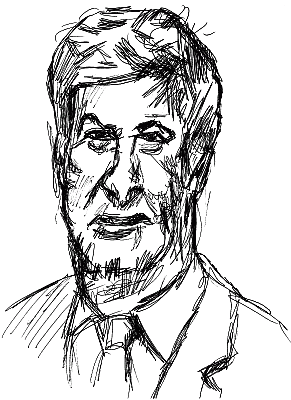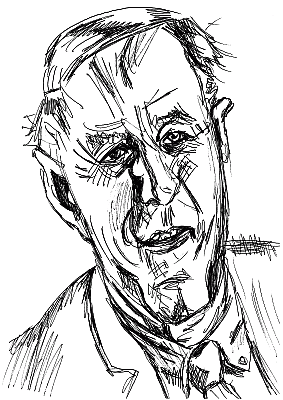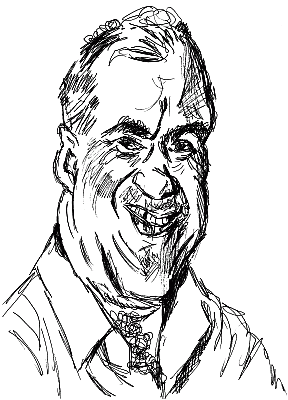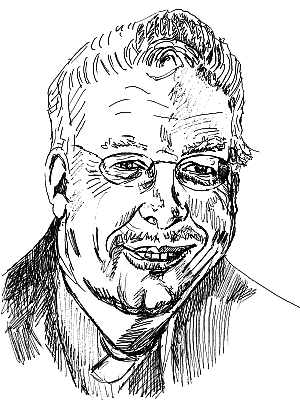|
Well thank you very much for that warm welcome and it's a pleasure to be here and to be able to come and join you at least for this evening and tomorrow. I'm sorry I wasn't able to be here for the whole of the conference but I'll try and get it into the diary for next year.
|
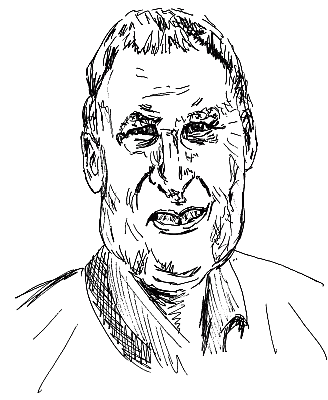
|
|
I want to, if I may, just to make two or three very general points as they relate to the world of theological education and then to say a word or two more about the particulars of some of those.
|
|
Firstly, it seems to me that in a gathering like this we need to be very clear about the importance of our identity as evangelicals. It seems to me that this will be a challenge that we face within the life of the Church of England for many years to come. The identity of evangelicalism of course has broadened rather enormously in recent years and it has become rather convenient - even popular in some ways - to claim the name of evangelical. And because of that (I understand why that is the case), but because of that it seems to me to be particularly important that we are very clear about our evangelical identity. And if you are just wondering - and you may or may not be of course - what I mean by that let me explain it in a minute or two.
|
|
What I understand by our identity as evangelicals is this. That we believe in the supreme authority of scripture in all matters of life and faith (interestingly, as a principal of a theological college, it is rather important when you believe that that the scriptures are actually opened and consulted [laughter in audience] and studied, but it seems to me that one of our key marks is that mark of authority of scripture). The second key mark I would identify is a doctrinal mark. An awful lot of people appeal to generalities. 'Well evangelicals are the sort of people who do this, or the sort of people who join CMS (or used to join CMS),' and things like that. It ever seems to me that evangelicalism has ever marked out not by the generalities but by the specifics. And when it comes to doctrine it seems to me that our understanding of the substitutionary atonement of Jesus Christ is at the heart of a defining mark of what it means to be an evangelical. Thirdly (there's only four). Thirdly, the whole understanding of our relationship with Jesus Christ as a personal relationship with a personal God, and it is to that that we are converted. And fourthly, and finally, our commitment to evangelism. Evangelism is another one of those words that has been broadened to - well, or submerged maybe more than broadened - under this overall title of "mission" and you wonder what it really means when that is debated. We are committed, are we not, to bringing the gospel message of Jesus Christ to those who do not know Jesus. And in this land that is 95% of the people, and 95% of the people in this country facing hell unless the message of the gospel is brought to bear. So those are my four points about evangelical identity: the priority of scripture, substitutionary atonement at the heart of our doctrinal beliefs, the need for personal relationship with Jesus and our commitment to evangelism.
|
|
Two comments on the end of that if I may, which in some places would certainly not make me popular. I do think, you know, that this means we must be very wary about embracing a Catholic understanding of the Church. There is enormous temptation for evangelicals to embace an Anglo-Catholic understanding of the Church, its nature and its ministry. And I think we need to be very careful indeed that we do not betray - you have been debating the historical nature of Anglicanism, my book on the subject comes out in March, by the way [audience laughter]; and we need to be very careful indeed that we do not betray our evangelical identity by embracing an understanding of the Church that is not historic Anglicanism. When Robert Runcie said, "Evangelicals don't have an ecclesiology," what he meant was, 'I don't like the ecclesiology that evangelicals have.' [Murmers of agreement from audience.] We do not need to apologise for our understanding of the Church: we are simply to faithfully expound it. So that's my point on evangelical identity. The second point and more briefly. Can I just draw attention to - you'd expect me to say this, I'm sure - to the strategic nature of our theological colleges. I am sometimes asked why I took the post of Principal of Wycliffe where I have been for only just over a year. Well there are all sorts of answers one could give to that but one of the answers is that I view the post as strategic because it will allow influence to be brought to bear upon generations of the ministry. Now, you put yourself in the shoes of the liberals and you capture the theological colleges and you have captured the influence that is brought to bear upon generations of future ministers. And so I simply want to draw your attention to the strategic nature of theological colleges. And thirdly, I want to note the challenge that liberalism brings to us. We are all aware - in this room you don't need me to say or to explain to you the challenge that liberalism brings to the Church at large. I need [?]also want to warn against the nature of liberalism within our own midst. What I mean by that is this whole idea of what it means to be evangelical being broadened so that it encompasses everybody and everything. If the liberals seek to capture the theological colleges in order to exercise strategic influence, the first step will be to encourage liberal evangelicals to capture the evangelical colleges. And I just want to draw that challenge to your attention and not overlook it and not to think all is well.
|
|
Let me just make four very brief comments about theological education in really only a couple of sentences on each. Firstly, the issues we face: firstly funding. Were you not surprised to hear that? The financial systems of the Church of England, about which I could pontificate for longer than I am permitted here, are creaking audibly. That's because they were invented in the 1960s by a bunch of people formed and shaped by the theology and the politics of the 1960s and still think it applies today: in other words a highly centralised and a highly corporatist understanding of economics and of finance. And so the main financial flows for the theological colleges come from this central pot of the Church of England and the central authorities of the Church of England decide how many students we are allowed to admit. I think that's a restrictive trade practice, in my own humble opinion. And so the funding of the theological colleges will have to change. We at Wycliffe, and I know at Oak Hill was also very strong, as one or two others were, not for all [?]. We at Wycliffe increased the number of students by 15%, we actually broke the limit (as I know Oak Hill did) that you are allowed, because when people want to come and they want the education, they want the teaching, the training, what are you to do? And our fees were cut by 5%. And so what you find is that the financial system is being used as a manipulative tool within the institution in order to exercise control over the theological colleges' funding. Secondly, ethos. It is really important that we understand from the theological colleges that are evangelical - having perhaps been tested against the identity of evangelicalism that I have just set out - that their ethos is understood and set forth. Well I'm not here to do a sales pitch for Wycliffe. I'll simply tell you in a sentence what our ethos is: a passion for the teaching of scriptures, a commitment to evangelism and church planting and apologetics, and a passion for the ministry and leadership of the local church. I actually of all the, of the two plus four of the evangelical theological colleges in the Church of England, I am actually the only principal who has gone to that job from parish ministry. And I simply want to say to you that I think that makes a difference. I simply think that makes a difference. So ethos. Thirdly, and support. Can I just ask you to support your colleges? You will have links with all sorts of colleges, whether it is Oak Hill or whether it is Wycliffe, or whatever. Do please pray for those of us who ae working in these places and actually, you know, the time is going to come when if you wish these colleges to survive then the financial support will have to come as well. And if you really want my opinion I think every one of you here should go back to you churches and you should give either 10% of your parish share or an amount from your mission budget to the theological college of your choice in order to encourage the ministry in that place. We are probably within ten years of the colleges collapsing unless that happens. And that would be true for Oak Hill and would be true for Wycliffe. So the support needs to be prayerful and it needs to be real.
|
|
And finally just a brief comment on the state of theological education more generally in the Church of England. I don't know whether to be encouraged by the fact that 70% of the ordinands attend these two plus four evangelical theological colleges. I don't know whether to be encouraged by the number of young people coming into Oak Hill and Wycliffe. The reason I don't know is I am unsure whether to celebrate having a higher percentage of a smaller pool. If you look at ministry across the Church of England the trend is for people to train on part time courses. The trend is for pressure to be exerted on people not to attend the Oak Hills and Wycliffes of this world. The trend is to try to force people to train in an inadequate way. And any of you in pastoral ministry will know the difference on the ground is strikingly obvious. And so we do have subtle pressures going on within the system to exert pressure financially and exert pressure by trying to force people to train on these part time courses. It seems to me that the amount of time we give to in-depth theological training and biblical education and parish preparation is woefully inadequate, and it seems to me that two to three years full time work is the minimum that we should be seeking to provide for those who are charged with the leadership of the people of God in the next generation.
|
|
Well I've probably already said too much. I hope that just gives you a flavour really of the state of play in the world which I have come to inhabit. I told my students the other week that it was they who got me out of bed in the morning and the day I lost my love for the leadership of the local church will be the day I will resign as Principal - but not before. But the day and I lose my love for the preaching of the gospel in the local church that's the day when my particular college needs a new leader because that is the task to which we are called.
|
|
Can I finally just do a plug for a book - not one I have written: Guarding the Gospel is the book that summarises the talks, the sermons, the papers, of NEAC - and it has only been published in the last couple of months. And it's an excellent book with a wide range of material in that, from sermons through to the detailed talks. I will put some out on the bookstall probably tomorrow morning (they're in the boot of my car at the moment). They are £7.50. Currently, if you are paying by cheque pay it to Wycliffe Hall because that is where the cost has been paid for for the moment. So I will put some of these out on the table for either cash or cheque and it's a fantastic opportunity to get hold of this book and so do please take me up on that. I'm looking forward to enjoying the rest of the conference. Thank you Ted [?].
|

